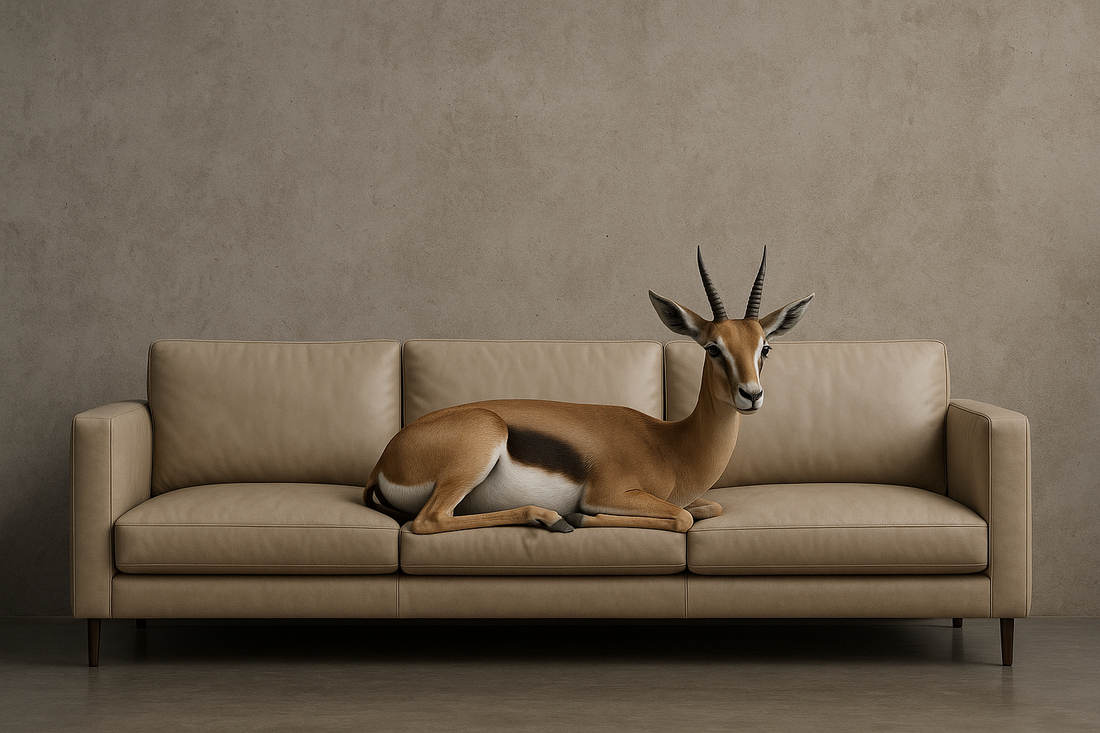
Why we see animals on sofas – and recognize ourselves in them
Share
An animal on a sofa is more than a picture—it's a mirror of our repressed nature. A profound, psychologically grounded essay by Brandhoek on the relationship between humans, space, and animals.
⸻
Why we see animals on sofas – and recognize ourselves in them
Sometimes we only understand ourselves when we see something foreign in our own spaces. An animal on a sofa acts like a mirror, forcing us to rethink our relationship with nature. Brandhoek explores precisely this shift in perspective—at the intersection of art, psychology, and ethics.
Biology, Evolution & Mirror Neurons
Our brain reacts with alarm when something unexpected intrudes on our familiar environment—an ancient survival program. But animals trigger far more in us than just this reflex: Their movements, gazes, and postures speak directly to our empathy system. We read them intuitively because our mirror neurons respond to them. Charles Darwin described in *The Expression of the Emotions in Man and Animals * how closely intertwined the emotional expressiveness of humans and animals is.
Depth Psychology: The Animalistic Within Us
For Carl Jung, the animal was a symbol of the unconscious—the part of us that longs for instinct, closeness, and authenticity. When an animal sits on our sofa, it touches this archetypal space within us: the memory of our own wildness.
In depth psychology, this is called projection: We often see in animals what we don't want to see in ourselves—freedom, anger, calm, independence. The animal becomes a silent mirror of our inner landscape. We interpret its behavior from a human perspective, forgetting that its gaze isn't reflecting us, but rather examining us.
Symbolism, myths and cultural interpretations
For centuries, animals have appeared in our stories, dreams, and spaces—as messengers, mirrors, and touchstones. In fairy tales, they embody moral extremes; in shamanic cultures, they are mediators between worlds; in modern art, they become political symbols. British author Melanie Challenger calls for bringing animals "into the room" so that they reappear in our language and ethics. This is precisely what Brandhoek does: Art brings animals back into spaces that we have long defined as exclusively human.
Human-animal relationships today: research, ethics and identity
How we perceive animals says a lot about us. Studies show that our moral values—fear, control, protection, affection—directly determine how we treat animals. The animal on the sofa is thus an ethical test: How do we react when the unfamiliar becomes part of our everyday lives?
Recent research shows that animals experience emotions—joy, sadness, fear, curiosity. When they sit on our sofa, they occupy the same space as we do. This reveals how deeply our relationship with them is characterized by control and dependence—a silent but fundamental question of power.
Philosophers like J. Howard Moore and Peter Singer call for expanding the moral circle—from humans to all sentient beings. In this sense, the animal on the sofa becomes a symbol of coexistence: It represents the moment when boundaries dissolve.
Reflection: When the animal looks at us
Perhaps the real shock isn't that an animal is sitting on our sofa—but that it's looking at us. It's not looking to judge, but to be. In this gaze lies a reminder of what we've forgotten: belonging.
Perhaps we ourselves have long been sitting on a sofa that does not belong to us – in a world that looks at us and asks whether we still understand it.
Brandhoek invites us to endure this gaze. Because every animal in the room changes not only the atmosphere, but also us.
⸻
Author: Brandhoek ᛫ April 2022 ᛫ Cape Town
This work - Born to Listen - comes from a previous Brandhoek collection in 2022 and is no longer available.
It remains part of the Brandhoek Archives – a symbol of the beginning of a new perspective.
Further reading
-
Charles Darwin: The Expression of the Emotions in Man and Animals
-
Carl G. Jung: Symbols of Change
-
Melanie Challenger: Animals in the Room , Emergence Magazine
-
Psychology Today : The Emotional Lives of Animals
-
J. Howard Moore: The Universal Kinship